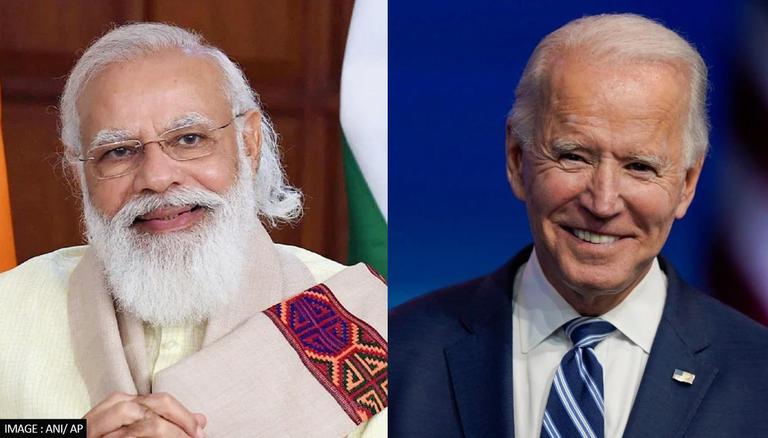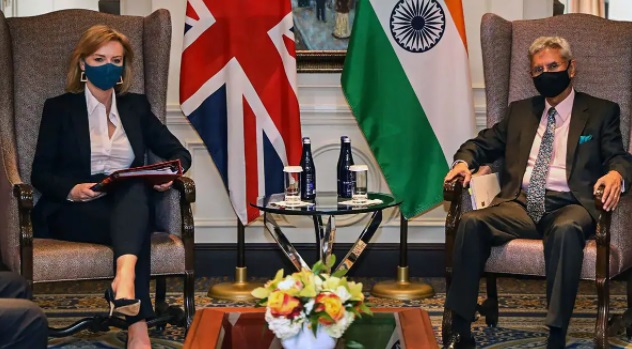Quad unveils new initiative to monitor maritime activity across Indo-Pacific
Four-nation grouping Quad on Tuesday launched a major new initiative for the Indo-Pacific that allows the partner countries to fully monitor the waters on their shores and help ensure peace and stability in the region, a move that comes amid China's increasingly intimidatory behaviour.
The announcement on the rollout of the Indo-Pacific Maritime Domain Awareness (IPMDA) came at the end of the second in-person Quad summit attended by Prime Minister Narendra Modi, US President Joe Biden, Japanese Prime Minister Fumio Kishida and his Australian counterpart Anthony Albanese.
A joint statement by the four leaders said the IPMDA will support and work in consultation with Indo-Pacific nations and regional information fusion centres in the Indian Ocean, Southeast Asia, and the Pacific Islands by providing technology and training to support shared maritime domain awareness to promote stability and prosperity.
The leaders reaffirmed their commitment to a free and open Indo-Pacific and vowed to work "tirelessly to deliver tangible results" for the region.
"The IPMDA embodies what the Quad stands for: catalysing our joint efforts towards concrete results that help to make the region more stable and prosperous," it said.
The leaders also announced the establishment of the 'Quad Partnership on Humanitarian Assistance and Disaster Relief (HADR) in the Indo-Pacific' that is aimed at further strengthening collaboration to effectively respond to disasters in the region.
According to a White House fact sheet, the IPMDA will offer a "near-real-time, integrated, and cost-effective" maritime domain awareness picture and it will transform the ability of partners in the Pacific Islands, Southeast Asia, and the Indian Ocean region to fully monitor the waters on their shores, and, in turn, "uphold a free and open Indo-Pacific”.
It said the new initiative will allow tracking of 'dark shipping' and other tactical-level activities, such as rendezvous at sea.
"Quad countries are committed to contributing to the region's maritime domain awareness -- a fundamental requirement for peace, stability, and prosperity -- through investment in IPMDA over five years.
“The partnership will innovate upon existing maritime domain awareness efforts, rapidly bringing emerging technologies to bear for the greater good of the Indo-Pacific community," the White House said.
China claims nearly all of the disputed South China Sea, though Taiwan, the Philippines, Brunei, Malaysia and Vietnam all claim parts of it. Beijing has built artificial islands and military installations in the South China Sea. China also has territorial disputes with Japan in the East China Sea.
The White House said the IPMDA will build a faster, wider, and more accurate maritime picture of near-real-time activities in the waters of its partners.
"This common operating picture will integrate three critical regions -- the Pacific Islands, Southeast Asia, and the Indian Ocean region -- in the Indo-Pacific. The benefits of this picture are vast: it will allow tracking of 'dark shipping' and other tactical-level activities, such as rendezvous at sea, as well as improve partners' ability to respond to climate and humanitarian events and to protect their fisheries, which are vital to many Indo-Pacific economies," the White House said.
It said the IPMDA will harness commercially-available data using existing technologies.
"Through a combination of automatic identification system and radio-frequency technologies, Quad partners can provide an unprecedented 'common thread' of activities. Because of its commercial origin, this data will be unclassified, allowing the Quad to provide it to a wide range of partners who wish to benefit," it said.
It said existing support infrastructure for information-sharing such as the Information Fusion Cente for Indian Ocean Region in India, the Information Fusion Center based in Singapore; the Pacific Islands Forum Fisheries Agency based in the Solomon Islands and the Pacific Fusion Center, based in Vanuatu, could be part of the initiative.
The White House said the Quad partners will begin immediate consultations on the opportunity with partners in the region.
"As the initiative proceeds, the Quad will identify future technologies of promise, allowing IPMDA to remain a cutting-edge partnership that promotes peace and stability throughout the region," it said.
In their statement, the Quad leaders reaffirmed their commitment to a free and open Indo-Pacific and emphasised the importance of fundamental values and principles.
They also expressed their commitment to work tirelessly to deliver "tangible results" to the region.
"In doing so, we will regularise the Quad activities, including regular meetings by the leaders and foreign ministers. We agree to hold our next in-person summit in 2023 hosted by Australia," they said.
The Quad leaders on Tuesday also strongly opposed any coercive, provocative or unilateral actions that seek to change status quo and increase tensions in the Indo-Pacific and reaffirmed their resolve to uphold the international rules-based order, amidst China's growing assertiveness in the region.
"We strongly oppose any coercive, provocative or unilateral actions that seek to change the status quo and increase tensions in the area, such as the militarization of disputed features, the dangerous use of coast guard vessels and maritime militia, and efforts to disrupt other countries' offshore resource exploitation activities," said a joint statement issued after the meeting.
It said the Quad is committed to cooperation with partners in the region who share the vision of a free and open Indo-Pacific.
"We will champion adherence to international law, particularly as reflected in the UN Convention on the Law of the Sea (UNCLOS), and the maintenance of freedom of navigation and overflight, to meet challenges to the maritime rules-based order, including in the East and South China Seas," the statement said.
The summit took place at a time when the relations between China and the Quad member countries have become tense, with Beijing increasingly challenging democratic values and resorting to coercive trade practices.
Relations between India and China nose-dived after the Eastern Ladakh standoff in 2020 following Beijing moving thousands of troops to several disputed areas along the Line of Actual Control (LAC) which was strongly objected to and resisted by New Delhi.
China claims nearly all of the disputed South China Sea, though Taiwan, the Philippines, Brunei, Malaysia and Vietnam all claim parts of it. Beijing has built artificial islands and military installations in the South China Sea.
India, the US and several other world powers have been talking about the need to ensure a free, open and thriving Indo-Pacific against the backdrop of China's rising military manoeuvring in the region.
"We strongly support the principles of freedom, rule of law, democratic values, sovereignty and territorial integrity, peaceful settlement of disputes without resorting to threat or use of force, any unilateral attempt to change the status quo, and freedom of navigation and overflight, all of which are essential to the peace, stability and prosperity of the Indo-Pacific region and to the world," the joint statement said.
The Quad will continue to act decisively together to advance these principles in the region and beyond, the statement said as it reaffirmed the four-nation grouping's resolve to uphold the international rules-based order where countries are free from all forms of military, economic and political coercion.
Source: rediff.com
26 May 2022,20:43




















 Live Tv
Live Tv








